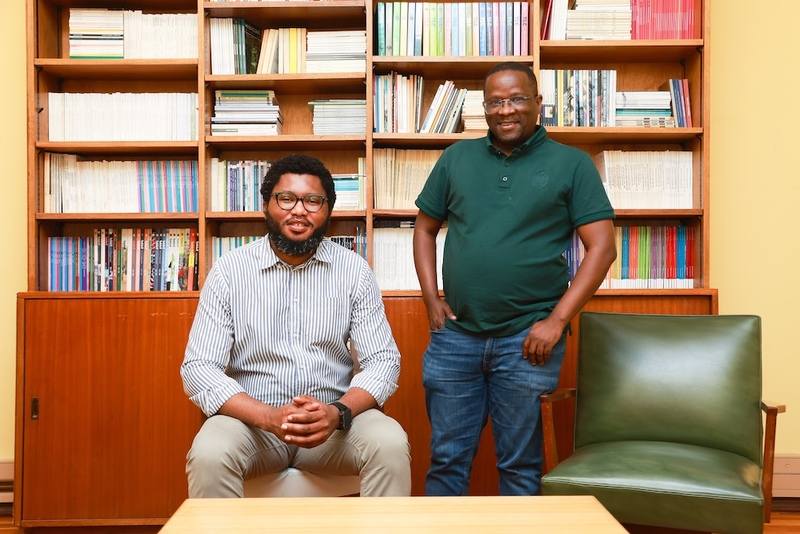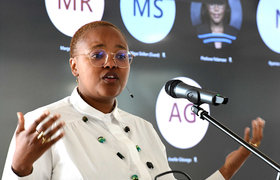Revisiting South Africa’s first black-owned newspaper
24 October 2025 | Story Myolisi Gophe. Read time 7 min.
The University of Cape Town (UCT) is at the forefront of an ambitious new project to breathe life into Imvo Zabantsundu, the first black-owned newspaper in South Africa. The initiative, selected as the 2026 African Critical Inquiry Programme (ACIP) Workshop, will see UCT academics join forces with colleagues, journalists, and creatives to revisit and reimagine the legacy of the pioneering newspaper founded in 1884 by John Tengo Jabavu.
The workshop, scheduled for March 2026 in Cape Town, is being organised by a UCT team comprising Dr Athambile Masola (Historical Studies), Associate Professor Litheko Modisane (Film and Media Studies), Dr Sanele kaNtshingana and Dr Wanga Gambushe (both from African Languages), alongside UCT alumna Associate Professor Sisanda Nkoala (Linguistics) of the University of the Western Cape (UWC). Over two days, participants will explore Imvo Zabantsundu as a “living and breathing archive” that continues to shape cultural, historical, and political thought in South Africa.
Imvo Zabantsundu – literally meaning “African opinion” – was more than a newspaper. As the country’s first black-owned and -edited publication, it gave voice to African intellectuals during an era when colonial print culture dominated the public sphere. It not only covered politics but also created a record of everyday concerns, including language use, sports, and social change. Though the paper ceased publication in the mid-20th century, its significance as a cultural artefact endures.
“The newspaper has often been referenced as a pioneering moment, but few have engaged with it in a sustained way,” said Dr Gambushe, a lecturer in UCT’s School of Languages and Literatures, where he teaches sociolinguistics, lexicography, and translation studies. “We want to revisit Imvo not as something frozen in the past, but as a dynamic archive that still speaks to contemporary debates.”

From conversation to collaboration
The idea for the project began informally. “Athambile approached us last year,” recalled Gambushe. “She said, ‘Imvo is turning 140. Why don’t we do something to mark this milestone?’ We sat together, thought about who to involve, and reached out to colleagues. That’s how the collaboration came together.”
The organisers subsequently hosted smaller events leading up to the ACIP proposal. One gathering at Woodstock’s UWC Iyatsiba Lab featured keynote addresses by historian Professor André Odendaal and renowned journalist Dr Mathatha Tsedu, who reflected on the legacy of African-language newspapers and their precarious place in today’s media landscape. Another seminar at UCT brought former Isolezwe lesiXhosa editorUnathi Kondile to campus, where he spoke to students about the challenges of sustaining isiXhosa newspapers.
“These conversations showed us both the urgency and the possibility of revisiting Imvo,” said Gambushe. “We realised this wasn’t just about history – it was about the future of African languages in public culture.”
UCT’s contribution has been pivotal, both academically and institutionally. For Gambushe, the project intersects directly with his teaching and research. “I’m interested in how newspapers like Imvo wrote about sports – rugby, hockey, cricket, tennis – at a time when these were seen as exclusively white spaces,” he explained. “There’s a myth that black South Africans were only introduced to rugby recently, but records show they have been playing it for over 200 years. Imvo can help us trace that longer history.”
His colleague Dr Ntshingana will bring a linguistic perspective, focusing on how core concepts in isiXhosa and other African languages have shifted over time. “He’s asking: What did words like umbuso mean in the 19th century? How were they debated in the pages of Imvo? And how do those meanings resonate today?” Gambushe said.
“As academics, our responsibility is not only to research and teach, but also to engage with the communities we live in.”
For Professor Modisane, the project links into film and media studies, situating Imvo within a broader “world of letters” in southern Africa. And for Dr Masola, a historian and poet, the project continues her work on black women’s intellectual history and the recovery of marginalised archives.
The workshop will combine close readings of available Imvo issues, group analyses of changing language use, and creative engagements such as a film screening. Importantly, the organisers see the workshop as just the beginning of a longer-term project.
“The plan is to produce an edited volume,” Gambushe confirmed. “Each of us will contribute chapters from our areas of expertise, and we’ll invite others – from former editors of Imvo to contemporary journalists and academics – to contribute as well. That way, the project doesn’t just stay within the academy but speaks to broader society.”
This bridging of scholarly and public worlds is central to the organisers’ vision. “As academics, our responsibility is not only to research and teach, but also to engage with the communities we live in,” said Gambushe. “Working with journalists, creatives, and media practitioners means we can ask harder questions about language, culture, and public life in South Africa today.”
Language, identity, and the future
For Gambushe, revisiting Imvo also raises difficult questions about the present. Why do African-language newspapers struggle to survive in contemporary South Africa, even while English publications dominate? “It may have to do with reading culture, with education, with colonial legacies of assimilation,” he reflected. “It’s something we need to research further. But what’s clear is that if African languages are not written, published, and read in high-function spaces; their vitality is under threat.”
He rejects the idea that isiXhosa is a “dying” language. “Sixteen percent of South Africans speak it. It’s alive and well.” But he insists it must be used in high-function domains like literature, media, and academia. “Projects like this workshop are part of that revitalisation.”
For UCT students, the project offers both intellectual and cultural benefits. It provides opportunities to engage with original sources, to think critically about language and identity, and to imagine how historical print cultures might inspire new forms of public expression.
“Ultimately, Imvo is not just about the past,” said Gambushe. “It’s about reimagining a multilingual public culture for South Africa’s future. That’s what excites me most: working with colleagues, students, and the broader community to bring this archive back into conversation with today’s world.”
 This work is licensed under a Creative Commons Attribution-NoDerivatives 4.0 International License.
This work is licensed under a Creative Commons Attribution-NoDerivatives 4.0 International License.
Please view the republishing articles page for more information.









